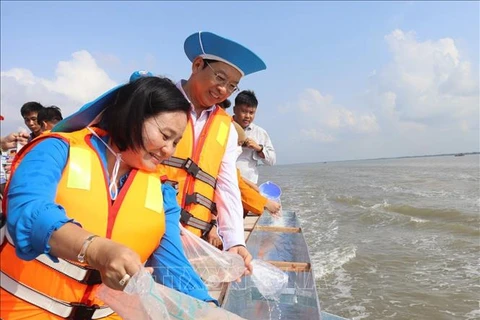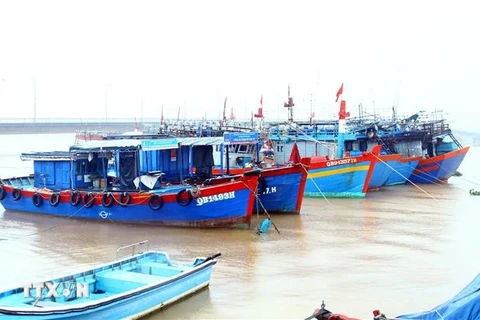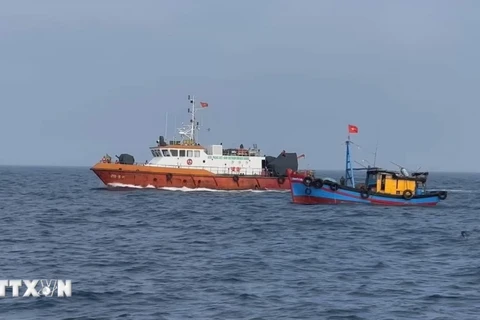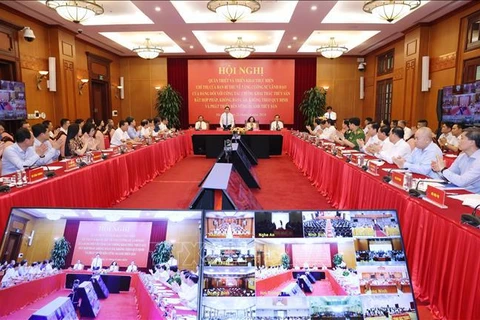Hanoi (VNA) – A raft of measures to deal with illegal, unreported and unregulated (IUU) fishing is included in the Government’s freshly issued action programme as the country is striving to clamp down on illegal fishing, or else it will be hit by the European Commission (EC)’s warning card.
Among the short-term measures carried out until May 2024 are improving public awareness of IUU fishing prevention through effective communications and training, and harmoniously and drastically implementing the fisheries law to manage fishing fleet. Besides, it is a must to comply with both Vietnamese and international laws on seafood traceability, while investigating, identifying and handling all acts related to illegal fishing.
Regarding long-term measures, the Government resolves to complete policies and regulations on the fisheries, especially those to thrust on modernisation of the sector, improve fishermen’s livelihoods and direct management of the fishery workers in accordance with both domestic and international labour regulations.
Furthermore, it will encourage public-private cooperation to develop technical fishery infrastructure, improve the capacity and responsibility of the fisheries surveillance force and competent agencies, and push ahead with state-of-the-art technology application and digital transformation in aquaculture to set up a sustainable production chain and a comprehensive ecosystem towards the circular economy and green economy, deep integration into the global supply chain and response to climate change.
Other highlights of the programme include enhanced international cooperation in the domain, negotiations on delimitation of the exclusive economic zones and continental shelves between Vietnam and foreign countries and settlement of sea disputes, and implementation of the international commitments and treaties on protection of the ocean resources and marine ecosystem.
Right after receiving the EC’s yellow card in 2017, Vietnam promptly enacted the Fisheries Law and established fishing vessel data covering registration and the issuance of fishing licences from central to local levels.
Relevant ministries, agencies, and coastal provinces and cities of the country have ramped up IUU fishing prevention tasks and solutions in line with directives of the permanent members of the Party Central Committee’s Secretariat, the Prime Minister, and the National Steering Committee on IUU Fishing Prevention./.
Among the short-term measures carried out until May 2024 are improving public awareness of IUU fishing prevention through effective communications and training, and harmoniously and drastically implementing the fisheries law to manage fishing fleet. Besides, it is a must to comply with both Vietnamese and international laws on seafood traceability, while investigating, identifying and handling all acts related to illegal fishing.
Regarding long-term measures, the Government resolves to complete policies and regulations on the fisheries, especially those to thrust on modernisation of the sector, improve fishermen’s livelihoods and direct management of the fishery workers in accordance with both domestic and international labour regulations.
Furthermore, it will encourage public-private cooperation to develop technical fishery infrastructure, improve the capacity and responsibility of the fisheries surveillance force and competent agencies, and push ahead with state-of-the-art technology application and digital transformation in aquaculture to set up a sustainable production chain and a comprehensive ecosystem towards the circular economy and green economy, deep integration into the global supply chain and response to climate change.
Other highlights of the programme include enhanced international cooperation in the domain, negotiations on delimitation of the exclusive economic zones and continental shelves between Vietnam and foreign countries and settlement of sea disputes, and implementation of the international commitments and treaties on protection of the ocean resources and marine ecosystem.
Right after receiving the EC’s yellow card in 2017, Vietnam promptly enacted the Fisheries Law and established fishing vessel data covering registration and the issuance of fishing licences from central to local levels.
Relevant ministries, agencies, and coastal provinces and cities of the country have ramped up IUU fishing prevention tasks and solutions in line with directives of the permanent members of the Party Central Committee’s Secretariat, the Prime Minister, and the National Steering Committee on IUU Fishing Prevention./.
VNA

























